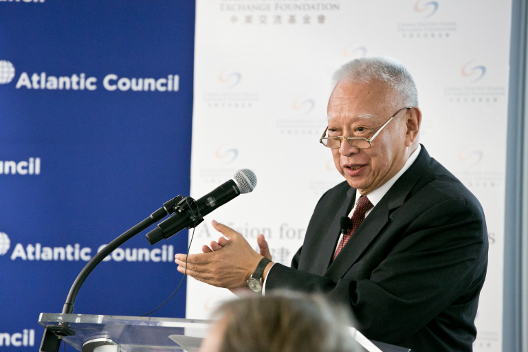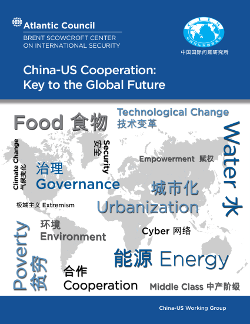 Prepared remarks by C. H. Tung, chairman, China-US Exchange Foundation; former chief executive and president, Executive Council of Hong Kong, delivered at a launch event for the report China-US Cooperation: Key to the Future on September 17, 2013.
Prepared remarks by C. H. Tung, chairman, China-US Exchange Foundation; former chief executive and president, Executive Council of Hong Kong, delivered at a launch event for the report China-US Cooperation: Key to the Future on September 17, 2013.
Related ContentDownload the report China-US Cooperation: Keys to the Global Future |
Ladies and Gentlemen,
I am delighted to have the opportunity to attend the rollout of this outstanding study, entitled China-US Cooperation: Key to the Global Future, a joint effort of distinguished US and Chinese scholars. The China US Exchange Foundation, of which I am the chairman, is proud to be associated with this study.
This study is based on a US report, Global Trends 2030: Alternative Worlds, prepared by the US National Intelligence Council, with contributions from the Atlantic Council; and a Chinese report entitled Global Trends to 2030 and the Prospects for China-US Relations, prepared by the China Institute of International Studies, with contributions from the School of International Studies at Peking University.
This study confirmed that the independently developed reports were generally consistent in their assessments of global trends and provided a solid basis for development of scenarios to illustrate what might happen under different assumptions about cooperation between China and the United States. The scenarios in both analyses depict markedly different outcomes for China, the United States, and the world. When China and the United States fail to cooperate, and pursue narrow interests or win-lose or zero-sum outcomes, both countries lose. But, when China and the United States cooperate to meet looming challenges, both countries benefit.
The fact is, the United States is the most developed nation in the world, and China is the largest developing nation in the world. By having the two countries working together with other major countries and stakeholders, we will have a better chance to successfully overcome the challenges.
This study outlines the case for collaboration between the two countries, and makes several specific recommendations to make cooperation both possible and fruitful.
On May 22 in Washington, our foundation rolled out an economic paper entitled US-China Economic Relations in the Next Ten Years: Toward Deeper Engagement and Mutual Benefit. This paper reviewed the overall benefits accrued to the two countries from the economic relationship since 1978 and examined some of the contentious issues that confront the economic relationship today, but most importantly, took a hard look at the economic relationships over the next ten years. From this paper, one can see that the economic relationship will become more and more interdependent in the years ahead.
What is the present state of US-China relations? As the two nations engage with each other more and more, the relationship is becoming broader and more complex. With that, unfortunately, misunderstanding, mistrust, and genuine differences inevitably arise. After all, we have different histories and cultures, and we are at different stages of development, and therefore our needs are different. It is important, however, that misunderstanding and mistrust be addressed, and differences be managed and contained, but under no circumstances should they affect the overall US-China relationship. Because from a multilateral perspective, as outlined in this study, and from a bilateral perspective, as outlined by the economic paper, the two countries have too much at stake. The relationship between the two countries must move forward positively.
Indeed, since President Nixon’s visit to China, eight Presidents of the United States and five generations of Chinese leaders have worked diligently to move the relationship forward. And throughout all these years, despite the ups and downs, it has been improving. But given today’s needs, there is greater urgency to move this relationship to the next level.
When President Obama and President Xi met each other in June in Sunnylands California, they called for the building of a new power relationship between China and the United States. And this call was repeated when they recently met on the sidelines of the G20 meeting in St. Petersburg. This study that is being rolled out today makes a compelling case for the need to build such a relationship. Indeed, I am confident that this study will help achieve this goal.


